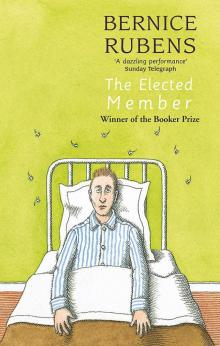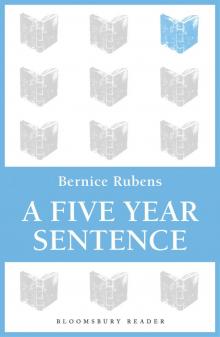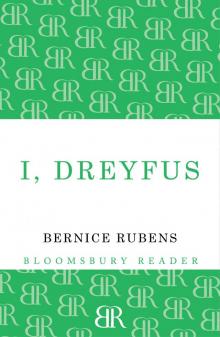- Home
- Bernice Rubens
The Elected Member Page 7
The Elected Member Read online
Page 7
She knew she would have to do it eventually. She couldn’t let him do it. She saw how frightened he was. Yet she resented again her hopeless burden. Why could they not reap at least a little advantage from his absence. Why not an hour or two’s holiday from the whole sorry business. ‘Why don’t you phone?’ she said, horrified and helpless in the face of her own cruelty.
‘On the telephone, I’m not so good,’ he said. ‘You ring. Bella,’ he pleaded.
She dialed the number. She wished her father would move away from the phone, and there was indeed nothing better that Rabbi Zweck wanted to do. He was afraid of knowing what he dreaded to know, yet he was still Bella’s father and he could afford to show no fear.
‘Finish your tea on the table,’ Bella said, trying to make it easier for him.
‘Yes, that’s right,’ he said gratefully, ‘is not good, cold tea.’
He went back to the kitchen and half closed the door. He heard the number ringing, and stretching out his foot, he pushed the door gently shut. He heard Bella’s voice, but not her words. He hesitated, then moved to the door. and opened it very slightly. ‘Good,’ he heard Bella say, and ‘Good’, again. His heart leapt with hope. He opened the door with more confidence. ‘I should go see him today?’ he yelled into the hall. He shut the door quickly, dreading the reply. He heard Bella’s voice and the intermittent silences, until the final click of the phone. He opened the door for her. ‘Well?’ he said.
She was smiling. ‘Everything’s fine,’ she said. ‘They’re very pleased with him. He had a good night, and he’s settling down well.’ She spoke quickly as if fearing to forget the verbatim report.
‘What did they say?’ Rabbi Zweck wanted a repetition. ‘He’s fine,’ Bella paraphrased. ‘He’s settling down.’ She was relieved that someone else hid the responsibility. But Rabbi Zweck wasn’t too pleased with the settling down. He’d seen the place. Bella hadn’t, and it was no place to get used to and settle down in. ‘Is that all they said?’ he asked.
‘He’s well,’ Bella repeated, ‘he’s had a good night and he’s settling down.’ Suddenly in her own repetition of the bulletin, she heard its falseness; she saw it being read off a prompter by the nurse in charge. Well, a good night, settling down. It was a formal stereotyped answer to all phone calls. Or perhaps an alternative. Bad. A restless night. Refuses to settle. Suppose, Bella wondered, the patient had died. Was there a prompter for that telephone call? But what did she expect after all. That he was off the pills for ever and sorry for all the trouble he had caused, deeply sorry, on his knees sorry, and ready to live a new life and repent it all?
‘Did you ask I should go and see him?’ Rabbi Zweck said timidly.
‘They said you should leave it for a few days.’ She hadn’t asked. She didn’t want her father going there. Let Norman be on his own a little, a problem to other people. Let him suffer a little for a change. She was allowed to have such thoughts after all. She only had to look at her father to entertain them.
Rabbi Zweck was half relieved that he was not allowed to go. He vaguely suspected that Bella hadn’t asked, and he was grateful to her, and happy to let the doubt lie, acknowledge the thing was under control. The slightest encouragement from any source generated a tremendous optimism in him. ‘I’ll have a big breakfast,’ he said, and Bella was glad to make it for him.
‘I’ll go in the shop today, Bella,’ he said. ‘Give you a rest.’
He didn’t want to go back to the search. Why should he not take a day off from it all? And perhaps if they cured him, the search wouldn’t be necessary. What was the point in asking for trouble. No. He’d leave it for today. He’d spend his time in the shop.
The shop was a refuge, for Bella too, and she dreaded a day in the flat. But she couldn’t refuse her father’s offer. But she was frightened by Norman’s unpresence. She herself felt strangely paralysed without him, as if her whole purpose had been removed. Her father was already at the door. She knew and understood his haste. ‘You’d better take a scarf with you,’ she said. ‘It can get chilly down there.’
‘I’ll be all right,’ he said opening the door, ‘I’ll turn the fire on if I get cold.’
She wanted to detain him. She had always taken her father’s dependence on her for granted, but now that he was going, and with such confidence, she knew that she could not manage without him, or at least without his needs, which together with Norman’s, were her sole means of sustenance. Now she was alone in the flat, and she turned from the door, and away from Norman’s room, and away from the kitchen, and away from each door, until she had turned full circle. She rushed to the front door in time to see her father turn the corner of the stair. ‘Call me if the shop gets full,’ she shouted after him.
‘I’ll manage,’ he shouted back at her. He sounded almost happy.
Chapter 7
As he raised the shutters over the shop door, he saw Mrs Golden waiting outside. It was unusual to have a customer so early. Then he remembered that Mrs Golden had been in the shop the day before and had witnessed Norman’s departure. She had returned panting for the latest bulletin. The sight of her sickened him. He didn’t need her veiled sympathy. He didn’t want any kind of reminder of yesterday. Yet she’d been Sarah’s, God rest her soul, closest friend, especially in her last days, when she had loved her enough to want to go before her. For Sarah’s sake he smiled and let Mrs Golden into the shop. She followed him as he trundled around the counter. Then once in position, behind the dividing board, he looked up and acknowledged her.
‘Mrs Golden, you want something?’
She drew a piece of paper out of her bag and handed it to Rabbi Zweck. This too was not Mrs Golden’s custom. Mrs Golden never knew exactly what she wanted. It was up to the shop assistant to suggest things to her to jog her memory. The suggestion of sugar would trigger off the need for tea, or butter for bread. Matches was a purchase she always forgot; there seemed no other commodity that Mrs Golden associated with it. But. today, all her needs were written neatly in a column, matches included. Rabbi Zweck shuffled around the shop collecting the items, and bringing them back one by one to the counter. Mrs Golden watched him, but neither said a word to the other. When Rabbi Zweck had collected the items together, he added up the bill on a piece of wrapping paper. ‘One pound, three and twopence?’ he said, looking up. She took two pound notes out of her bag and handed them to him. He gave her the change silently. Then she collected her purchases and put them one by one into her shopping bag. She turned on her way to the door.
Rabbi Zweck was angry. Hers was such a pointed silence, and he wondered generously whether she was sparing his feelings. Suddenly he decided he didn’t want his feelings spared. ‘Mrs Golden,’ he shouted after her, ‘why don’t you say something?’
Mrs Golden came back to the counter. ‘I thought perhaps you didn’t want I should speak.’
‘You have something to say?’ Rabbi Zweck said angrily, ‘say it then.’
‘Nothing,’ she murmured and turned to go away again. ‘He’s getting better,’ Rabbi Zweck called after her. Mrs Golden turned back once again, and settled down in the customer’s chair. ‘Thank God,’ she said. ‘Of course he’ll get better. What else should he get?’ She seemed against her will to have put an end to the conversation, and she was at a loss as to how to continue. She looked to Rabbi Zweck for a contribution.
‘He’ll be out soon,’ he said.
‘That’s good.’ Mrs Golden could find no more to say. Somehow they had both managed to by-pass the cause, the effects, the symptoms and the diagnosis, each of them subjects of gossip and speculation. Now all had been said. He was getting better. Soon he would be home. Such facts were not discussable. Yet Mrs Golden didn’t want to leave, and she felt too, that Rabbi Zweck wanted to detain her.
‘Stay a little, Mrs Golden,’ he said. ‘I’m not so busy.’
He had always called her Mrs Golden. Sarah, as well, although they had known her since they were married. In fact, as Rabbi Zweck tried to recal
l, he had entirely forgotten Mrs Golden’s first name. He could remember Mr Golden. He was Lewis. Lou, they used to call him. He’d been dead now for five years, and perhaps Mrs Golden would have to die before Rabbi Zweck could remember how she was called.
‘You remember,’ he said to her, ‘the early days, when the children were young, with your children, we went so often out. You remember the picnics we went together?’ ‘I remember the picnics,’ she said. Then taking her turn, she said, ‘You remember we all went to the Yiddish theatre? Remember?’
‘I remember,’ Rabbi Zweck said. His move. ‘You remember the school concerts? Remember?’
Mrs Golden remembered that too. The theatre, the picnics, the concerts, separately and by association, they triggered off total recall, and they sat together remembering it all, and needing each other’s silence.
‘What made him like this?’ Mrs Golden suddenly asked. For whatever she remembered, it was always around the figure of Norman that the recollection took place. And probably for Rabbi Zweck too. Because he was not surprised at her question. He had asked it of himself so many times. It was a question that had to be asked repeatedly. Just asked, and asked enough, all answers were superfluous. ‘He’s getting better,’ he said quickly. ‘This morning, I spoke to the doctor. Bella spoke. Very well, the doctor said he is. Is getting better,’ he repeated, alarmed at the hollowness in his voice.
‘Of course he gets better,’ Mrs Golden said. ‘But what made him like this. Such a clever boy he was. What made him like this?’
She was not grilling Rabbi Zweck. She wanted him to be able to talk about it.
‘Is getting better,’ he said again. He sat down on the high stool behind the counter. It was a gesture of helpless abdication. ‘Yes, you’re right, such a clever boy he was.’
‘You remember…?’ Mrs Golden started, and Rabbi Zweck was glad of yet another souvenir. While it lasted it cancelled out the present situation. It was only when it was over that the souvenir was faced as something that had once been and would never be again.
‘You remember.. Mrs Golden went on. Her storehouse was inexhaustible. Her efforts to take Rabbi Zweck’s mind off Norman, in his present state, by placing it fairly and squarely on Norman as he used to be, were unflagging. ‘You remember his first case, in the courts, and him there with his gown on and wig, looking like a pretty girl. We all went. you remember, Sarah, God bless her, with a new hat, brown it was, with feathers, my Lou, God bless him too, and the Teitlebaums and the Greenbergs and the Schwartz, the whole street, you remember. And how he won. Oi, how he won.’ She aimed at each word separately, picking them off with her tongue like single bull’s eyes. With his beautiful talk,’ she remembered, such a speech he made. Such a clever boy he was.’
Rabbi Zweck caught himself smiling only when the smile faded from his face. The recollection of Norman’s first triumph could only lead to the sad memory of his career’s decline and the shameful humiliation of his last stand at the bar. Rabbi Zweck knew that Mrs Golden was already mourning it in her mind and he did likewise, because it was an event that he had to recall again and again until he could come to terms with it, laugh at it even, such a joke it was, until perhaps the shame of it would evaporate.
It Was a nasty case and it should never have reached the public courts. In Rabbi Zweck’s mind it was nasty because it involved Jews, and Jews had their own court, only round the corner from his shop, and it should have been settled there without all the publicity it gathered when it came into the open. A nasty case it was, because it was a family quarrel and they should have been ashamed to let it out of the home. But they were bitter people, the Steinbergs, and they had quarrelled amongst themselves as long as anyone in the district could remember. They had been married for thirty miserable years, the last ten of which had been made even more wretched by the presence of old Mrs Cass, Mrs Steinberg’s mother. Of these ten years, Mrs Cass had spent five in bed, stubbornly immortal. Every morning the long suffering Mr Steinberg would take her her tea, and was at pains to hide his disappointment that she was waiting for it. And not only waiting, but grumbling that it was late, that it had too little or too much sugar, that no-one cared about her, that she knew she was a lot of trouble, but what was she to do.
‘Die,’ Mr Steinberg muttered to himself as he left the room. He would join his wife in the kitchen and they would listen to the old woman shouting from the downstairs bedroom, ‘You’re waiting for me to die, aren’t you?’
‘Yes, we are,’ the Steinbergs muttered separately to themselves, but occasionally Mr Steinberg would speak the thought aloud, and his wife would bombard him with accusations of meanness, inhumanity, and general no-goodness. Their quarrels and the old woman’s screaming could be heard intermittently throughout the day and night across the back yards of the neighbourhood, and they had come to be accepted as part of the natural discords of the area.
To complicate matters, there was Mrs Steinbergs brother, a low-life if ever there was one, called Bertie. Bertie’s adult life had been punctuated by a series of sudden and prolonged absences, spells in gaol, rushed visits abroad, and periods of lying low. He was a compulsive thief, stealing from friends, strangers and family alike. Mrs Steinberg hated him for the apologies and lies she had to tell on his behalf, for the face she had to keep in front of her friends, although they knew her face-saving tactics and pitied her for them. And she hated her brother because of their pity.
He rarely came to the house to see his mother, for which Mrs Steinberg was on the one hand grateful, but on the other, outraged by his unfilial behaviour. On the rare occasions that he visited, he would pick a quarrel with the old lady, and leave with a piece of silver or anything he could lay his hands on quicker than his sister could remove it, and after each of his departures, Mrs Steinberg would take a belated inventory. And as she viewed her slowly depleting silver collection, she felt grateful that her brother did not come more often.
And then one day, for the first time, she had notice of his coming. Or at least, she fully expected him to show up, as any son, filial or otherwise, would show up to his mother’s death bed. For old Mrs Cass had finally made it; after years of threats and curses she had uttered her last. Mrs Steinberg closed her mother’s eyes, and guilt-riddled and sob-shaken, she went about the house, clearing the decks.
When Bertie arrived, Mr Steinberg was sitting with the old lady, and when Bertie entered the room, Mr Steinberg left discreetly, suspecting that Bertie had his own private atonements to make. He joined his wife in the kitchen where they sat and stared at each other. Even old Mrs Cass’s death had done nothing to soften the loathing between them. If anything it had intensified it, each blaming the other for her passing. ‘Don’t know what you’re crying for,’ Mrs Steinberg said. ‘It’s what you’ve been waiting for, isn’t it?’
‘Ach,’ he spat at her, ‘shut your big mouth. Weep, weep,’ he went on, ‘you got plenty to cry for.’
They heard slow footsteps in the hall, and the slamming of the front door. They looked at each other sharply and it would be fair to suppose that the same question flashed through both their minds. What, besides the body, was takeable in the old lady’s room.
They darted to the bedroom, hesitating with respect, in case respect were still in order, at the door. Then, stealthily, they crept inside. She lay there, not surprisingly, as Mr Steinberg had left her, and without moving, he and his wife shot glances about the room, looking for reasons for Bertie’s hasty departure. And there it was, or wasn’t, as the case may be, and both of them saw it at the same time. The large white no-longer-thereness on the old lady’s fourth finger. ‘It was there when I left her,’ Mr Steinberg whispered, hastening to absolve himself from suspicion.
‘Who else, who else?’ Mrs Steinberg screamed, careless of her company, ‘who else, who else, but Bertie.’
They approached the body, and Mr Steinberg, with the temerity allowed to the next-but-one-of-kin, lifted the naked finger. There it wasn’t indeed, neither in the
folds of the sheet, nor under the pillow, nor anywhere in the vicinity of the’ bed. It was gone; the sum total of the old lady’s wealth, her inheritance from her husband, his few shares, her pension, her furniture, her silver, all in that giant diamond amalgam that had sat so smugly on her fourth finger. Pogrom money, she used to call it, because it was portable and currency anywhere. But now it was gone, and probably melted down again into cash, and running through Bertie’s fingers.
Mrs Steinberg bristled with rage. She would get it back, or at least the value of it, ‘if it’s the last thing I do,’ she shouted. ‘Poor Momma,’ she whispered, though pity for that quarter was now irrelevant, but it helped to excuse her feelings of unnatural hatred towards her brother.
And so it was, when the old lady was decently buried, and Bertie protesting his innocence on the way to and from the funeral, and all through the Shiva, that the matter was eventually brought to the courts, and Norman, Rabbi Zweck’s boy, a genius he is, was hired to put Mrs Steinberg’s case.
The court was crowded. Rabbi Zweck sat at the back in an agony of anxiety. He didn’t care too much which way the case went. With Bertie’s record, it was a foregone conclusion that he was guilty and he didn’t care too much what happened to him. It was Norman and the fear for his performance, that frightened him. He sat with Bella, and she shared his fear, because at that time, two years ago, only they had shared the secret of Norman’s drug addiction. They had tried to dissuade him from taking the case, using all kinds of excuses, that he should not get himself mixed up in such a nasty business. They knew his career in Law was finished, but this he would never accept. They were persecuting him, all of them, he said, they refused him his dignity, they were mad.
Why only that morning, before leaving for the courts, he had sprayed the whole flat with insecticide, and thrown his pillows into the bath to drown their evil habitation. He looked yellow and drawn and they had tried again to dissuade him, to give up the case, to send a message to the court that he was not well. ‘You’re ruining my career,’ he shouted at them. ‘You want to destroy me completely.’ And he had grabbed his gown and briefcase, and made for the door. ‘You used to be so proud of me,’ he said. ‘What happened to you?’

 The Elected Member
The Elected Member Sunday Best
Sunday Best Nine Lives
Nine Lives Madame Sousatzka
Madame Sousatzka A Five Year Sentence
A Five Year Sentence I, Dreyfus
I, Dreyfus